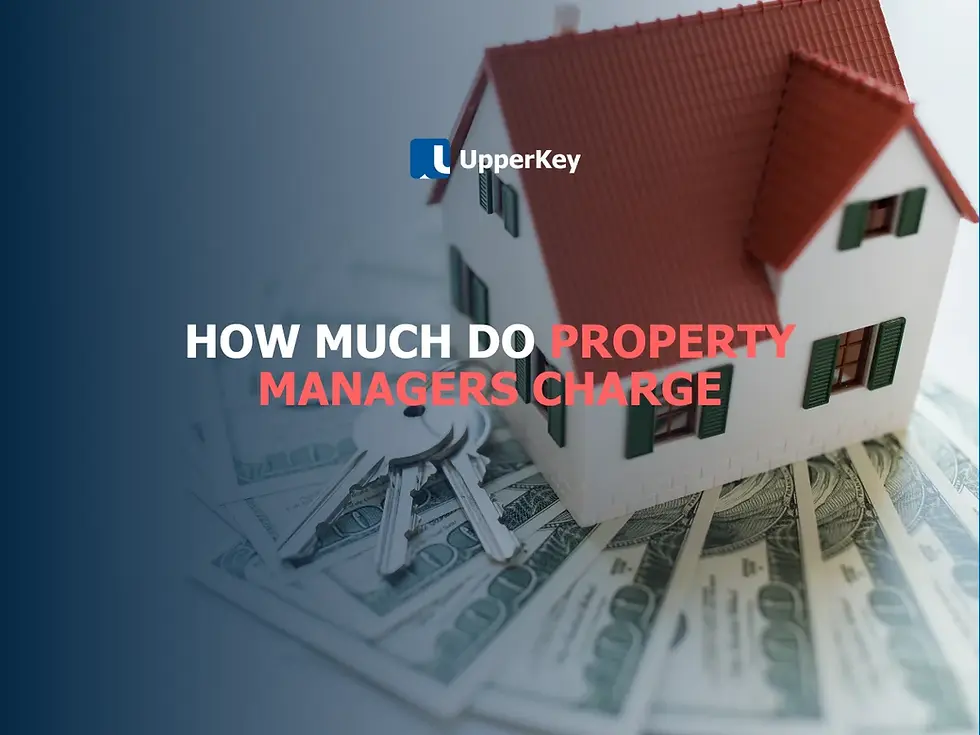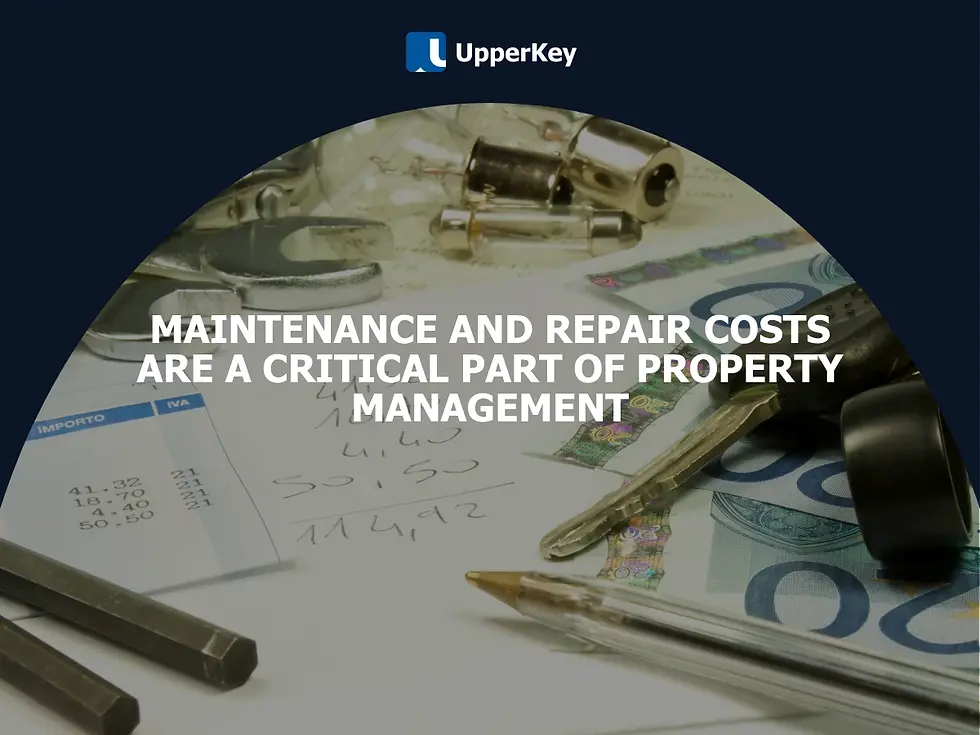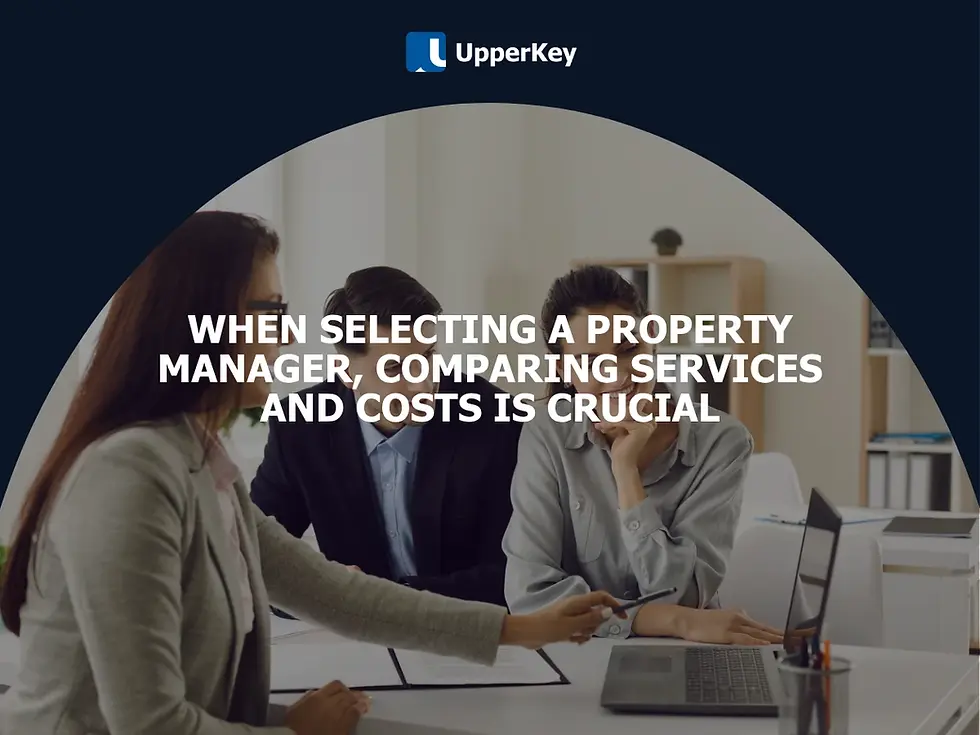How Much Do Property Managers Charge
- UpperKey

- Jul 18, 2025
- 8 min read
Updated: Jul 23, 2025
Hiring a property manager can be a game-changer for those who own rental properties but prefer not to handle the day-to-day operations. Understanding what property managers charge is crucial for any property owner looking to make informed decisions. Fees can vary widely depending on the services offered and the location of the property, and it’s essential to get a clear picture of what to expect.
Agent fees are another important cost consideration for landlords when hiring property managers or letting agents. From tenant sourcing to maintenance coordination, including collecting rent property managers provide a range of services designed to ease the burden on landlords. This guide will break down the common fees associated with property management, helping you decide if hiring a professional is the right move for you.

Table of Contents
Introduction to Property Management Fees
Understanding property management fees is essential for anyone considering hiring a property manager. These fees can vary greatly, making it important to be well-informed about what to expect. Typically, property management fees are structured in a few common ways, with several factors influencing these charges. Letting agent fees are another category of charges landlords may encounter, often related to tenant sourcing, tenancy agreements, and rental management.
Common Fee Structures
Property management fees often follow standard structures. The most common is percentage based fees, where managers charge a percentage of the monthly rent, usually between 8% to 12%. Another option is a fixed fee, sometimes referred to as a fixed monthly fee or flat monthly fee, which may also include administration fees ere a set amount is paid regardless of rent. This is less common but might suit properties with high rental income and is an alternative to percentage based fees.
Some managers use a hybrid model, combining percentage and flat fees. For example, a manager might charge a low percentage fee but add fixed charges for certain services. Understanding these structures helps property owners choose the best fit for their needs.
Each structure has its pros and cons. Percentage based fees align manager interests with property performance, while fixed fees, such as a fixed monthly fee or flat monthly fee, offer predictable costs. Choosing the right structure for your needs is crucial, as professional management depends on your property type and financial goals.
Factors Influencing Charges
Several factors affect property management fees. Location plays a significant role; properties in high-demand areas often have higher fees due to competitive markets. Property size and type also impact charges, with larger or more complex properties usually incurring higher fees. However, some landlords may benefit from lower fees if their properties require less intensive management, such as property inspections, or are located in less competitive markets.
Another factor is the scope of services provided. Basic management includes rent collection and maintenance coordination, while full-service management might include tenant placement and legal compliance. The more services included, including legal fees the higher the fee is likely to be.
Lastly, the experience and reputation of the management company can influence charges.
Established firms with a strong track record may charge more than newer or less experienced companies due to their proven expertise and reliability.
Standard Fees Explained

Standard property management fees cover the core services provided by managers. Understanding the cost of property management, including financial reporting, is essential for budgeting and evaluating the value of professional services. These fees are crucial to understand, as they form the basis of what you’ll pay regularly and can significantly affect your property’s profitability.
Management Fee Breakdown
The management fee is the primary charge in property management. It covers essential services like rent collection, tenant communication, and maintenance coordination. Typically calculated as a percentage of monthly rent, this fee is usually based on the monthly rent collected, ensuring the manager’s ongoing involvement in the property’s operation.
Services included in the management fee can vary. Some managers offer all-inclusive packages, while others charge extra for specific tasks. It’s important to clarify what’s covered to avoid unexpected costs.
Understanding the management fee structure helps in budgeting and evaluating value for money. It’s a key consideration when comparing different property management offers. Property management fees vary depending on the property type, location, and the range of services included.
Leasing and Renewal Charges
Property managers may charge additional fees for leasing and renewal services. These fees cover the costs of finding new tenants and negotiating lease renewals. Leasing fees usually equate to a percentage of the first month’s rent or a flat fee, compensating for marketing, credit checks, and tenant screening efforts. This is often referred to as a 'tenant find' service, which includes advertising the property and sourcing suitable tenants.
Renewal fees are typically lower and cover lease agreement updates and tenant retention efforts. They might be a flat fee or a small percentage of the monthly rent.
These charges ensure professional handling of tenant transitions, minimising vacancy periods and maintaining rental income stability.
Average Fees in the UK
When considering property management in the UK, it’s important for landlords to be aware of the typical costs involved. On average, property management fees in the UK range from 10% to 15% of the monthly rental income. These fees can vary depending on the property management company, the location of your rental property, and the specific full management services you require.
For landlords seeking full property management, which includes everything from tenant sourcing to ongoing maintenance and legal compliance, management fees usually fall between 12% and 15% of the monthly rent. If you only need a rent collection service, the cost is generally lower, often between 5% and 10% of the monthly rental income. The average property management fees reflect the level of involvement and the range of services provided by the management company.
Understanding the average property management fees in the UK is essential when hiring a property management company. It allows landlords to budget effectively and compare offers from different providers. Since management services and fees in the UK can vary depending on the company and the services provided, it’s wise to request a detailed breakdown before making a decision.
Additional Costs to Expect
In addition to standard fees, there are other costs associated with property management. These can include maintenance, repairs, and marketing fees, among others. Knowing these costs upfront can prevent surprises down the line. Landlords should also be aware of potential hidden costs that may not be immediately apparent in management agreements.
Maintenance and Repairs

Maintenance and repair costs are a critical part of property management. Managers usually coordinate these services, ensuring properties remain in good condition. Maintenance and repair work is a core part of property management responsibilities. Costs can vary based on property age, location, and specific needs.
Some managers include basic maintenance in their fees, while others charge separately. It’s important to understand your manager’s policy on maintenance and who bears the cost of repairs.
A clear maintenance plan helps in managing these expenses effectively. Regular property maintenance is essential for preserving property value and tenant satisfaction. It also ensures property value is preserved, benefiting landlords in the long run.
Advertising and Marketing Fees
Advertising and marketing fees cover the costs of promoting your property to potential tenants. These fees might include online listings, photography, and signage. Effective marketing is crucial for reducing vacancy periods and attracting quality tenants.
Some managers factor marketing into their leasing fees, while others charge separately. Advertising and marketing are often considered specific services that can be tailored to the landlord’s needs.
Good marketing strategies enhance your property’s appeal and rental potential. Clear communication with your manager on these efforts is essential for successful tenant acquisition.
Negotiating Property Management Fees
Landlords are not always locked into the first fee structure offered by a property management company. In fact, negotiating property management fees is a common practice, especially for those with multiple properties, as not all property managers offer the same flexibility or terms. Many property management companies are open to discussing their management fees and may offer discounts or tailored packages to secure your business.
If you own several rental properties, you may be able to negotiate a lower overall property management cost by bundling your portfolio under one agreement. Similarly, committing to a longer contract can sometimes result in reduced management fees. When negotiating, consider the fee structure, the range of services included, and the company’s reputation in the local market. Don’t hesitate to ask for a customized proposal that fits your needs.
By taking the time to negotiate, landlords can often reduce their property management costs and increase their rental income, particularly if they seek dedicated property management services.
Comparing Services and Costs

When selecting a property manager, comparing services and costs is crucial. It ensures you get the most value while meeting your property’s unique needs. Choosing the right property management company for your needs is essential, as it can significantly impact your rental income and overall satisfaction. A detailed comparison can guide you in choosing the right management partner. Service quality should be weighed alongside cost when comparing options, as both are key factors in evaluating property management companies. Careful property management company choosing is essential for long-term success.
Finding the Right Fit
To find the right property manager, consider a few steps:
List your needs: Identify what services you require beyond standard management.
Consider outsourcing property management to specialized agencies or professionals, which can save landlords time and reduce stress.
Research potential managers: Look into their reputation, experience, and service offerings.
Compare costs: Review fee structures and additional charges to understand total expenses.
These steps help in selecting a manager who aligns with your objectives and budget. A well-matched manager can enhance your property’s performance and income.
Balancing Cost and Quality
Balancing cost and quality is key in property management. A low-cost manager might not provide the same level of service as a higher-priced one. Conversely, high fees don't always guarantee superior service.
Comparison Table:
Aspect | Low-Cost Manager | High-Cost Manager |
Service Level | Basic | Comprehensive |
Response Time | Slower | Faster |
Tenant Screening | Limited | Thorough |
Consider what's most important for your property. Sometimes, investing in quality management can lead to better long-term returns and tenant satisfaction.
Common Mistakes to Avoid in Property Management
When hiring a property management company, landlords can sometimes make avoidable mistakes that impact their rental income and overall experience. One common error is failing to thoroughly research the property management company’s reputation and track record. It’s essential to check online reviews, request references, and ensure the company has experience managing similar properties, especially if they offer premium services.
Another frequent mistake is not fully understanding the fee structure or what services are included in the contract. Landlords should always review the agreement in detail and ask questions about any unclear terms or potential hidden fees. Overlooking these details can lead to unexpected costs and dissatisfaction with the management services provided.
Finally, poor communication can cause issues down the line. Choose a property management company that is transparent, responsive, and proactive in keeping you informed. By avoiding these common pitfalls, landlords can enjoy a smoother property management experience and maximize their rental income.
Final Thoughts on Choosing a Manager
Choosing the right property manager is a significant decision. It affects your property's success, tenant relations, and overall financial performance. Careful consideration of all factors is essential.
Key Questions to Ask
When interviewing property managers, ask key questions to gauge their suitability:
What is your fee structure, and what does it include?
How do you handle maintenance and repairs?
What is your approach to tenant screening and retention?
How do you handle tenant management as part of your services?
These questions provide insight into how the manager operates and whether they meet your expectations. A thorough interview helps in making an informed choice.
Making an Informed Decision
To make an informed decision, combine your research with professional advice. Some landlords opt for self management to save on costs, but this requires more time and effort. Speak to other landlords or property investors for recommendations and insights. Understanding the local rental market is also important when deciding between self management and hiring a property manager.
Review contracts thoroughly: Ensure all fees and services are clearly outlined.
Consider long-term impacts: Think about how the manager’s services align with your investment goals.
Trust your instincts: Choose a manager you feel confident about and who demonstrates understanding of your property’s needs.
A well-chosen property manager can be an asset, enhancing your property’s value and your peace of mind.





